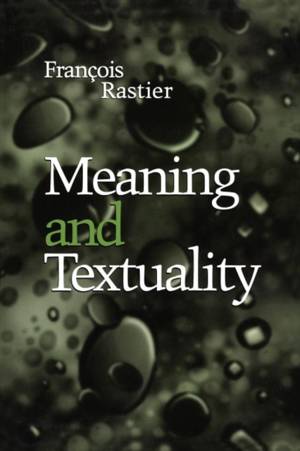
- Afhalen na 1 uur in een winkel met voorraad
- Gratis thuislevering in België vanaf € 30
- Ruim aanbod met 7 miljoen producten
- Afhalen na 1 uur in een winkel met voorraad
- Gratis thuislevering in België vanaf € 30
- Ruim aanbod met 7 miljoen producten
Omschrijving
Historically there has been a wide gulf between European and Anglo/American thought on the philosophy of language, in part because it is often difficult to find important European works in English translation. Meaning and Textuality represents key elements of the ground-breaking new theory on signs and discourse that has come out of Europe in the last few decades.
Meaning and Textuality is an investigation into methods useful to the analysis of language and literature. Rastier seeks ways to better understand signs, with emphasis on their relation to action and culture. He proposes a theoretical framework for the semantic description and typology of texts. Towards this end he establishes a critical debate among various streams of research before arriving at a synthesis of literary semiotics, thematics, and linguistic semantics. The author sees this synthesis as a means by which to reconcile the rigour of linguistic analysis with the complexity of literary interpretation. In the later portion of the book he tests his propositions in a series of detailed investigations of French literary texts by Zola, Maupassant, Mallarmé, Apollinaire, and Jodelle. Each study examines a new problem such as narrative ambiguity or referential impression.
This book will be welcomed by scholars in any discipline concerned with discourse analysis and the close reading of texts.
Specificaties
Betrokkenen
- Auteur(s):
- Vertaler(s):
- Uitgeverij:
Inhoud
- Aantal bladzijden:
- 352
- Taal:
- Engels
- Reeks:
Eigenschappen
- Productcode (EAN):
- 9780802080295
- Verschijningsdatum:
- 6/12/1997
- Uitvoering:
- Paperback
- Formaat:
- Trade paperback (VS)
- Afmetingen:
- 163 mm x 228 mm
- Gewicht:
- 449 g

Alleen bij Standaard Boekhandel
Beoordelingen
We publiceren alleen reviews die voldoen aan de voorwaarden voor reviews. Bekijk onze voorwaarden voor reviews.











